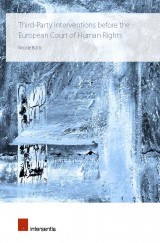Description
Third-Party Interventions before the European Court of Human Rights
Author: BÜRLI Nicole
Language: English
Subjects for Third-Party Interventions before the European Court of...:
Approximative price 92.57 €
In Print (Delivery period: 8 days).
Add to cart
Publication date: 04-2017
300 p. · Hardback
300 p. · Hardback
Description
/li>Biography
/li>
Over the past decades the European Court of Human Rights has been
increasingly engaged in constitutional decision-making. In this time the
Court has decided whether abortion, assisted suicide, and surrogate
motherhood are human rights. The Court’s judgments therefore do not just
affect the parties to a particular case, but individuals, other member
states, and often European society at large. Unsurprisingly, a variety of
entities such as non-governmental organisations, try to participate in the
Court’s proceedings as third-party interveners. Acknowledging a certain
public interest in its decision-making, the Court accepted the first
intervention in 1979. Since that time, interventions by individuals,
member states and non-governmental organisations have increased. Yet
despite this long-standing practice, third-party interventions have never
been fully theorised.
Third-Party Interventions before the European Court of Human Rights is the first comprehensive and empirical study on third-party interventions before an international court. Analysing all cases between 1979 and 2016 to which an intervention was made the book explores their potential influence on the reasoning and decision-making of the Court. It further argues that there are three different type of intervention playing different roles in the administration of justice: amicus curiae interventions by organisations with a virtual interest in the case which strengthen the Court’s legitimacy in its democratic environment; member state interventions reinforcing state sovereignty; and actual third-party interventions by individuals who are involved in the facts of a case and who are protecting their own legal interests. As a consequence, the book makes a plea for applying distinct admissibility criteria to the different type of interventions as well as a more transparent procedure when accepting and denying interventions.
Third-Party Interventions before the European Court of Human Rights is the first comprehensive and empirical study on third-party interventions before an international court. Analysing all cases between 1979 and 2016 to which an intervention was made the book explores their potential influence on the reasoning and decision-making of the Court. It further argues that there are three different type of intervention playing different roles in the administration of justice: amicus curiae interventions by organisations with a virtual interest in the case which strengthen the Court’s legitimacy in its democratic environment; member state interventions reinforcing state sovereignty; and actual third-party interventions by individuals who are involved in the facts of a case and who are protecting their own legal interests. As a consequence, the book makes a plea for applying distinct admissibility criteria to the different type of interventions as well as a more transparent procedure when accepting and denying interventions.
Dr Nicole Bürli has been a human rights adviser with the World Organisation Against Torture since 2014. Prior to this, she was a research associate at the University of Zurich (2008–2012) and a visiting fellow at the University of Copenhagen (2012) and the University of Cambridge (2013). Nicole Bürli holds law degrees from the University of Bern and the University of Zurich.
© 2024 LAVOISIER S.A.S.




